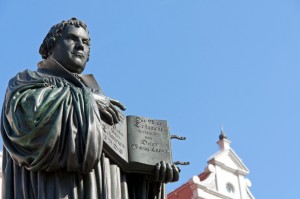 Over the years many scholars have suggested that the Reformers had little interest in the task of world missions or evangelism. I have countered this idea concerning Calvin at this site and in several different publications (one, two, three). Here I’d like to address Luther.
Over the years many scholars have suggested that the Reformers had little interest in the task of world missions or evangelism. I have countered this idea concerning Calvin at this site and in several different publications (one, two, three). Here I’d like to address Luther.
I have not encountered among lay people as much the idea that Luther did not care about missions, but the idea has been fairly common among various scholars. For example Kenneth Scott Latourette in his influential A History of the Expansion of Christianity (vol. 3) included Luther in his assessment that “several early leaders of Protestantism disavowed any obligation to carry the Christian message to non-Christians.” Latourette said Luther believed the end of the world was so imminent that “no time remained to spread the Gospel throughout the world.” Furthermore, according to Latourette Luther did not understand the New Testament to place any burden on the church to take the gospel to the ends of the earth (interestingly, Latourette cites only a secondary source for these assertions; see the relevant page in Latourette).
However, a recent book shatters this view of Luther. Luther and World Mission: A Historical and Systematic Study, by Ingemar Öberg (translated by Dean Apel) is a massive and impressive study. Here are a few points drawn from Öberg’s work.
In Luther’s little classic, A Simple Way to Pray, Luther taught his people to pray for the conversion of unbelievers and for the gospel to be preached over the whole world. Luther encourages his people to meditate on each petition of the Lord’s Prayer and then to pray along the lines of each petition. Under both the first and second petition he suggests we pray for the conversion of unbelievers.
Secondly, the conversion of the “heathen” was a significant theme in a number of Luther’s hymns. If you are aware of Luther’s works you know how important the church’s songs were to him and the essential role he saw for them in teaching and forming character. Thus, the fact that this theme occurs frequently in his hymns suggests the importance given to the theme. For example here is an excerpt from his hymn based on Psalm 67 (a great missions psalm):
Would that the Lord would grant us grace,
With blessings rich provide us,
And with clear shining let his face
To life eternal light us;
That we his gracious work may know,
And what is his good pleasure,
And also to the heathen show
Christ’s riches without measure
And unto God convert them.
Öberg gives examples of other hymns and notes that in the preface to a certain hymnal Luther emphasized that the worshipful singing of believers can draw unbelievers to faith.
Lastly, Luther called for the gospel to be taken to the Bohemians, the Russians and the Muslim Turks, and shortly after his death mission work to these groups had begun (see pages 498-99). In this, he is similar to Martin Bucer, the Reformer of Strasbourg who chastised the European church for failing to mount a serious mission effort to the Turks.
So, yes, Martin Luther was concerned for evangelism and missions, even while he dealt with death threats from the most powerful institutions of his day, organized a new church and helped a generation rethink their basic worldview in light of the newly available Scriptures. What’s our excuse?